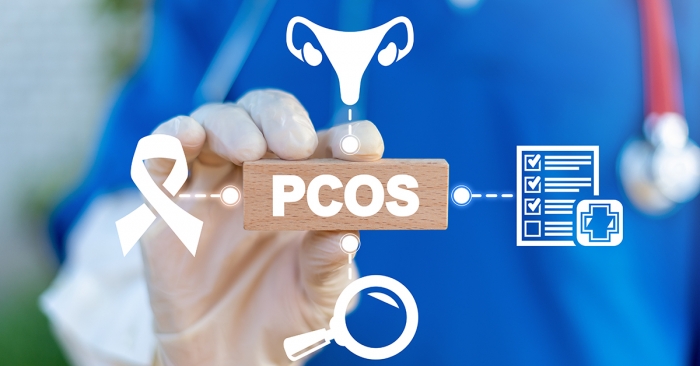Women of all ages can experience a number of gynecological and hormonal issues. Luckily, OB/GYNs and other medical professionals can successfully treat and manage them. One condition that affects a number of women is polycystic ovarian syndrome, which is often referred to by the initials PCOS.
What is PCOS?
Polycystic ovarian syndrome, or PCOS, is a hormonal condition that affects females. It is the most common cause of infertility in women. The cause is unknown but it is thought to be related to environmental factors as well as genetic influences. Though “polycystic” implies that multiple cysts are involved, not all women have cysts on the ovaries. As the PCOS Awareness Association explains, three main hormones come into play in polycystic ovarian syndrome:
- Androgens: Though androgens are considered male hormones, all females make them as well. In PCOS, the levels of androgens are often elevated, leading to symptoms like acne, hair growth, and irregular periods.
- Insulin: This hormone helps regulate blood sugar and helps the body turn it into energy. Women with polycystic ovarian syndrome sometimes become insulin resistant, so the body produces more. High levels of insulin lead to high levels of androgens.
- Progesterone: This female sex hormone helps regulate the menstrual cycle and ovulation. People with PCOS have low levels of progesterone, which makes periods irregular.
Signs and Symptoms of Polycystic Ovarian Syndrome
Sometimes people experience the symptoms of PCOS soon after puberty, but some women will not see symptoms until early adulthood. The symptoms can be attributed to other conditions, so sometimes it takes a while for polycystic ovarian syndrome to be diagnosed. Common symptoms include:
- Irregular or missed periods: ovulation is often interrupted so menstruation does not occur regularly.
- Infertility: PCOS is one of the most commonly diagnosed causes of infertility. Not all women will have fertility issues. Some can conceive naturally and some can conceive with fertility treatments.
- Weight gain: Difficulty losing and managing weight is common, as is obesity.
- Unwanted hair growth on body/hirsutism: Excess hair growth on the face, back, chest, arms
- Thinning hair on head: While unwanted hair appears on the body, hair on the head may fall out and thin, which can increase in middle age.
- Mood changes: There is an increased likelihood of mood swings and/or developing anxiety and depression.
- Fatigue: Feelings of tiredness and low energy may be related to sleep disturbances.
- Sleep disturbance: People may experience insomnia or sleep disorders such as sleep apnea.
- Skin changes: Hormonal changes can cause skin changes such as acne, skin tags, or hyperpigmentation.
- Pelvic pain: Pelvic pain during periods is a common symptom, as is heavy bleeding. Pelvic pain may be present when not bleeding as well.
- Headaches: Disturbances in hormonal balance can cause frequent headaches.
Diagnosis and Treatment of PCOS
If you have symptoms, there is not a specific test to diagnose polycystic ovarian syndrome. The doctor will ask you questions about your symptoms and perform a physical exam with a family history. Other tests may be ordered to rule out other conditions. These tests might include ultrasounds to evaluate the ovaries and look for cysts. Blood tests to check sugar and hormone levels are also used.
If you are diagnosed with PCOS, you may or may not be referred to an endocrinologist that can work with your regular doctor for treatment. An endocrinologist is a doctor that specializes in hormonal issues. There are several treatment options that can help manage symptoms and promote regular ovulation, but the condition cannot be cured.
Medications used to treat polycystic ovarian syndrome include:
- Hormonal birth control: Birth control with both progestin and estrogen can help with regulating menstruation, reduce excess hair growth, and reduce acne. It can be taken orally or via a patch or vaginal ring.
- Spironolactone: Treats acne by blocking androgen’s effect on the skin. Should not be used if you are pregnant or planning to become pregnant because it has been linked to birth defects.
- Clomiphene: Anti-estrogen medication used to help stimulate ovulation and help with fertility.
- Metformin: Originally used to treat type 2 diabetes, this medication can help control insulin levels. It is often given in conjunction with clomiphene and can help with weight loss.
- Letrozole: A breast cancer treatment that can stimulate the ovaries for ovulation.
- Progestin therapy: Can help regulate the menstrual cycle and guard against endometrial cancer.
- Gonadotropins: Hormonal injections that stimulate ovulation.
You can also make lifestyle changes to improve and manage symptoms. The changes seem simple but can make a real impact. Eat a healthy diet low in simple carbohydrates to control insulin levels and get regular exercise. Both of these can also help you manage your weight, which can make a big difference in symptoms. Maintaining a healthy weight can help keep insulin lower as well as androgens. This might restore regular ovulation.
Make an Appointment
The team of physicians, nurses, and medical staff at Raleigh OB/GYN Centre have been providing the women of the Raleigh area with personalized and comprehensive care for 45 years. From the first well-woman appointment to menopause management and every stage in between, our team will be there. If you have concerns about any obstetric or gynecological issues, including PCOS, call us at (919) 876-8225 to make an appointment. You can also request an appointment online.


